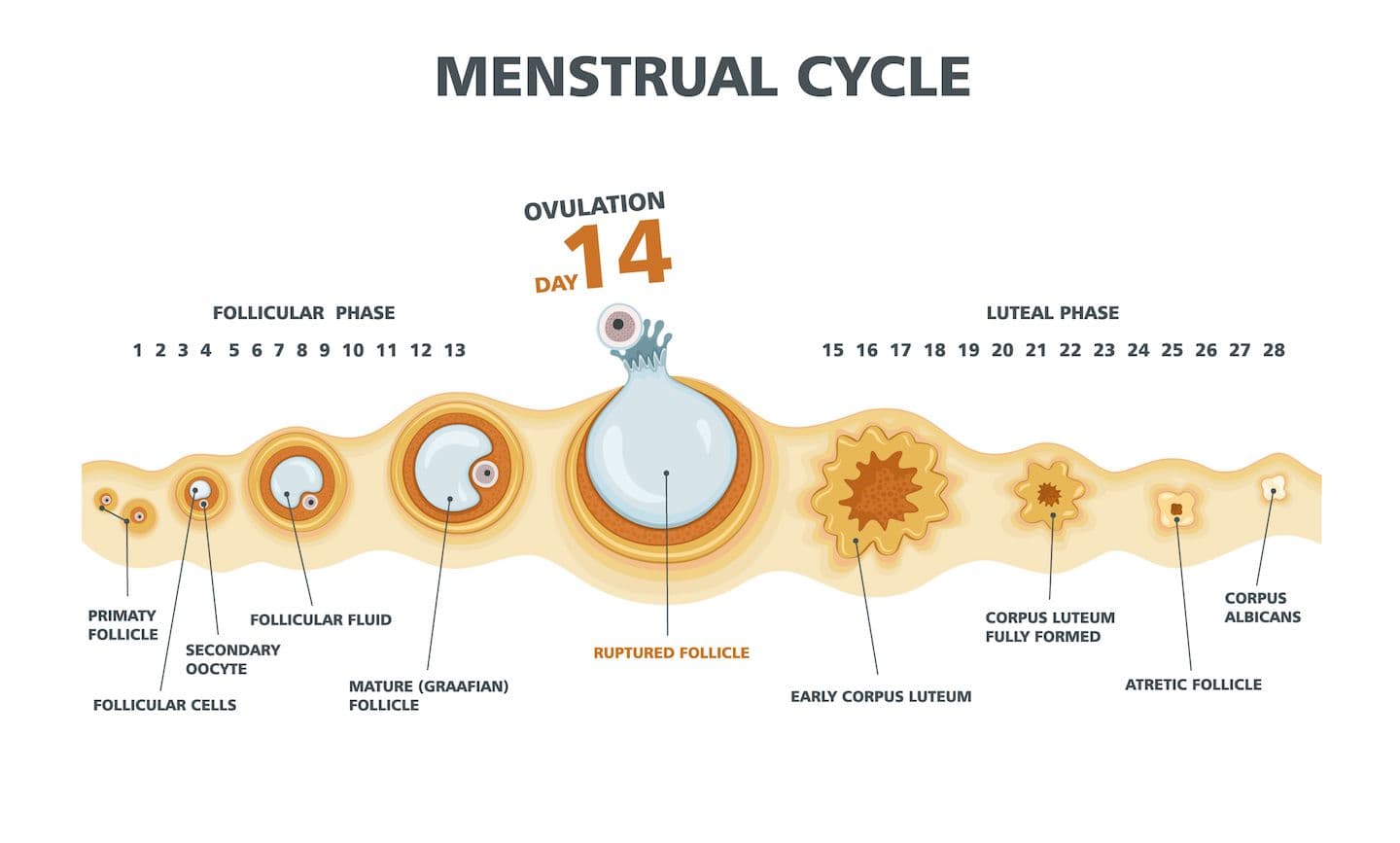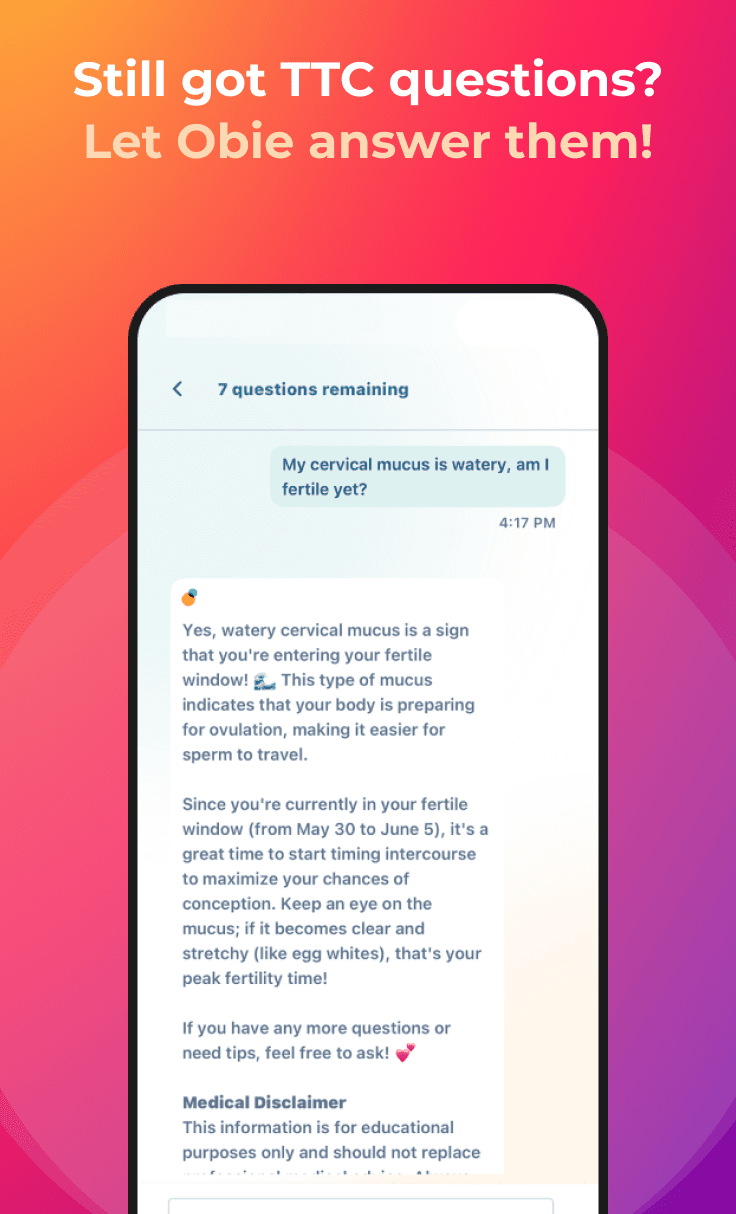The Big O: Ovulation
babyMed University
Obie Editorial Team

What is ovulation?
Ovulation is the release of an egg (the follicle) from the ovary. When trying to get pregnant, ovulation is vital. Ovulation occurs when an egg is released from the ovary, and is available to be fertilized. Fertilization with a sperm usually happens in the outer portion of the fallopian tube. Unless you are pregnant, your period usually begins 14 days after ovulation.
What happens when there is no fertilization?
Fertilization occurs when the sperm joins the egg. This usually happens within 12 to 24 hours after ovulation. If the egg is not fertilized, it dies off and is absorbed by the body and menstrual bleeding begins about 14 days after ovulation.
What happens when there is fertilization?
If the egg is fertilized, when the sperm joins with the egg, which usually happens within 12-24 hours after ovulation, it first becomes a large balls of cells (morula) and then a blastocyst about 4-5 days after fertilization. The morula and blastocyst move down the fallopian tube towards the uterus where it arrives and implants (attaches to the uterine lining) on average 9 days after ovulation and fertilization.
How often does ovulation happen?
Ovulation, the release of the ovum, happens on average every 28 days (normal range of 21-35 days).
What time of the day does ovulation happen?
It's impossible to determine from your BBT curve whether you ovulated at night or in the morning. We can't even be 100% sure of the day with the BBT curve. Once there is a typical rise in the temperature, all we can say is that ovulation probably happened about 24-36 hours prior to that rise.
With the ovulation predictor kit, we can assume it happens within 12-36 hours of the OPK first turning positive.
Check this OPK ovulation calculator of when you may ovulate.
Sex and getting pregnant
Your chances of getting pregnant increase if you have sex regularly, more often, and as you get closer to the day of ovulation. Your fertility also increases the more often (but no more than once a day) you have sex throughout the cycle, not just during the fertile days. Your chances of getting pregnant are nearly zero if you have sex after ovulation. Why? Sperm need about 12 hours of "prep time" in your uterus before they can fertilize the egg. And the egg usually doesn't survive long, maybe only 12-24 hours, for that to happen. So to get pregnant it's best to have sperm already close to the egg when ovulation happens. That's why when you want to get pregnant the best time to have sex are the 1-2 days before and the day of ovulation. Not the day after.
If I get my period, does it always mean I ovulate?
Bleeding in and by itself is not always a good enough confirmation of ovulation. It's possible to have vaginal bleeding without ovulation. Your regular menstrual periods come every 21-35 days and last on average three to six days, but you can have vaginal bleeding even if you don't ovulate; without regular ovulation, your menstrual periods are usually not as regular as those periods that follow ovulation. For irregular cycles, supplements such as FertilAid for Women can help promote hormonal balance and cycle regularity.
"How do I know whether I am ovulating?" is one of the most important and frequent questions Dr. Amos hears. There are several ways to find out.
Checking yourself for ovulation:
- Regular menstrual cycles: If you have a very regular menstrual cycle lasting between 21 and 35 days, then you can usually assume you ovulate regularly.
- Fertility charting: Fertility charting includes taking your basal body temperature and looking for other fertility signs such as changes in the cervical mucus. A biphasic basal body temperature chart, a curve that increases and stays up, shows reliably that you ovulated.
- Cervical mucus: Typical changes in cervical mucus will also help you figure out when and if you ovulate and when your fertile days are.
- Ovulation predictor kits (OPK): OPKs are pretty reliable methods of detecting ovulation. A positive OPK can predict ovulation most of the time.
How your doctor checks:
- Blood progesterone levels: An elevated progesterone level about a week after presumed ovulation confirms ovulation.
- Pelvic ultrasound examinations: If they are done before and after ovulation, they can show the development of the follicle, and if it disappears, ovulation can be assumed.
- Endometrial biopsy: An endometrial biopsy about 10 days after ovulation can confirm that ovulation happened.
Key facts about ovulation
- Normally one egg is released each time of ovulation.
- Double ovulation, the release of more than one eggs, can happen, and if it happens it usually occurs within 24 hours of each other.
- Having twins with two separate fathers can happen with superfecundation or superfetation.
- The release of an egg (follicle) can happen each month from the same ovary, and there is no regular change from one to the other ovary.
- An egg lives 12-24 hours after leaving the ovary.
- Ovulation can be affected by drugs or other medical factors.
- The #1 cause of ovulation problems is PCOS: Polycystic ovary syndrome.
- Some women may experience some light blood spotting during ovulation.
- Implantation of a fertilized egg normally takes place 9 days after ovulation with a range of 6-12 days.
- Each woman is born with millions of immature eggs (follicles) that are awaiting ovulation to begin, but at the time ovulation begins about 400,000 follicles are left.
- You can bleed even without ovulation but that is not considered a normal menstrual period.
- Ovulation can occur even if a regular menstrual bleeding/period has not occurred previously.
- Some women can feel a bit of pain or ache near the ovaries during ovulation called mittelschmerz, which means "middle pain" in German.
- If an egg is not fertilized, it disintegrates and is absorbed into the uterine lining.
- If you are not pregnant you usually bleed about 14 days after ovulation.
- On average, ovulation happens every 28 days (normal range: 21-35 days).
- More than 1 eggs are released rarely (less than 1% of the time).
- After ovulation, the egg lives up to 24 hours.
- Implantation of the blastocyst, the fertilized egg normally happens on average 9 days after ovulation (range: 6-12 days).
- Normal regular menstrual bleeding, a normal menstrual period usually happens only after ovulation.
How do I know whether I am ovulating?
If you have a very regular menstrual cycle lasting between 21 and 35 days, ovulation is likely happening, but you cannot always assume exactly when you will ovulate.
Pelvic ultrasound examinations: If they are done before and after ovulation they can show the development of the follicle and if it disappears, ovulation can be assumed.
An endometrial biopsy about 10 days after ovulation can confirm that ovulation happened.
Ovulation predictor kits (OPK): OPKs are pretty reliable methods of detecting ovulation. A positive OPK can predict ovulation most of the time.








